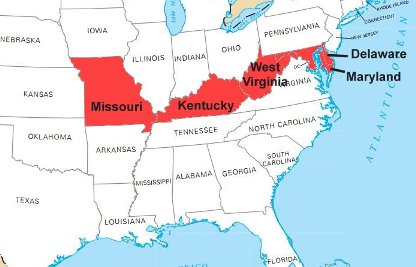American Civil War : Border states
Learn about the American Civil War : Border states including Kentucky, Maryland, Missouri, Delaware, and West Virginia
American Civil War : Border states
What were the border states?
The slave states that remained in the Union throughout the Civil War were the border states. Delaware, Kentucky, Maryland, and Missouri were among these states. West Virginia, which broke away from Virginia during the conflict, was seen as a border state as well.

Border States
- Kentucky: According to President Abraham Lincoln, Kentucky’s adherence to the Union was a key component in the Union’s victory in the Civil War. Kentucky was initially a neutral state during the war but subsequently came under Union rule.
-
Maryland : Maryland played a significant role for the Union. The only thing separating Virginia from Washington, D.C., the capitol of the Union, was the state of Maryland. Should Maryland have left the Union, the course of the war would have been considerably different. In 1864, Maryland decided to end slavery during the conflict.
- Missouri : Missouri elected to stay in the Union and not separate at the commencement of the war, but many residents of the state thought the fight against the Confederacy was wrong. The Missouri state government broke into two adversarial governments as the war went on. Both state governments had secession votes, but only one of them wanted to leave the Union. Because of this, the state was briefly claimed by both the Union and the Confederacy.
- Delaware : Despite being a slave state, Delaware had few slave owners at the start of the war. The state was always committed to the Union and didn’t actually border any Confederate states.
- West Virginia : When Virginia left the Union, West Virginia splintered off and established its own state. It remained committed to the Union, but West Virginians were divided. Twenty thousand West Virginians participated in the Confederate cause.
Other Border States
Tennessee, Oklahoma, and Kansas are some additional states that are occasionally regarded as border states. These states were all staunch supporters of the Union and the Confederacy.
Why were they important?
The Union’s success was greatly aided by maintaining control of the border states. These states offered the Union a financial, manufacturing, and military advantage.
Did everyone support the Union?
In the border states, not everyone favored the Union. In some instances, such as Missouri and West Virginia, there was a fairly even distribution of support for each side. The Confederate Army recruited thousands of soldiers from the border states who traveled south. Politicians in these states actively supported secession as well. Many residents of the border states believed the war against the Confederacy was wrong, even though they did not want secession. They believed that the states ought to have the option of leaving the nation.
Slavery and Emancipation
The main factor for President Lincoln’s prolonged delay in issuing the Emancipation Proclamation was the border states. His release of the slaves was demanded by abolitionists in the North. Lincoln was aware that the war had to be won, though. He was torn between requiring the border states to win the war and wishing to free the slaves. He understood that to fully free the slaves, he needed to win the war.
Did brothers really fight brothers?
Yes. On the same battlefield, brothers were frequently engaged in combat. Families all around the nation disagreed on the matter. Even sons opposed their fathers in battle.
Facts about the Border States During the Civil War
- “I hope to have God on my side, but I must have Kentucky,” stated Abraham Lincoln once.
- William and James Terrill, brothers, each rose to the rank of brigadier general, James for the South.
- Tennessee did secede, but in 1862 it was brought back under Union rule.
- Small raids and guerilla warfare were primarily conducted in Missouri and Kansas. The Lawrence Massacre, during which a small group of Confederates murdered over 160 citizens in Lawrence, Kansas, was the bloodiest of these raids.
Read also:American Civil War Causes
 The First Encyclopedia Your First Knowledge Home
The First Encyclopedia Your First Knowledge Home
